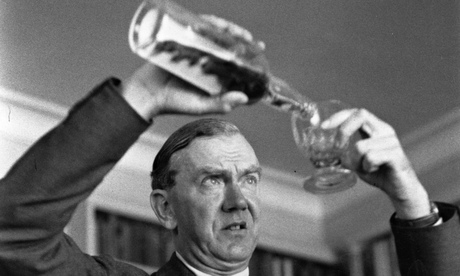
For the past year I have only read books about drink. I have just handed in the first draft of my book so I am now reading something purely for pleasure. I have chosen a novel by Allan Massie called A Cold Winter in Bordeaux; it’s part of a quartet set in occupied France. It’s wonderful to lose myself in such expertly done historical fiction, but at times it feels like I am still researching my book, because my god there’s a lot of drinking in it. The hero, Jean Lannes, a policeman, is always having an armagnac, stopping for a glass of marc with a shady character, offering Dubonnet to his mother-in-law, ordering a demi-litre of medoc or a bottle of St Emilion, or sipping a beer. Despite the privations and compromises of war, a little part of me thinks: occupied Bordeaux doesn’t sound so bad – at least there was plenty to drink.
Alcohol plays a prominent role in much fiction. There’s a whole sub-genre of novels, often by Graham Greene, that are odes to the melancholy pleasures of gin. The most gin-soaked novel ever is probably Hangover Square by Patrick Hamilton. It could easily put you off alcohol for life but there are also novels that will have you licking your lips and reaching to the back of the drinks cupboard for a dusty bottle of Ricard.
Hemingway is a good place to start. The name-checking of drinks in A Farewell To Arms – Asti Spumante, marsala, Cinzano, Martini, chianti etc – is so abundant that Andrew O’Hagan in a London Review of Books essay said it read like Hemingway was in the pay of drinks companies. I disagree: for the true booze enthusiast, those words have a poetry about them. Especially in wartime, the familiar names of drinks would be a comfort – just as they are for Massie’s detective. For Charles Ryder in Brideshead Revisited, a particularly fine burgundy is a “reminder that the world was an older and better place ...”
Brideshead might not be Waugh’s best novel but wouldn’t it be fun to drink your way through it? There’s the Clos de Bèze and montrachet from the scene above, plus cognac, vouvray, sauternes – and lashings of claret. It’s not the convivial drinking of Hemingway: instead, Waugh uses wine as a weapon of snobbery. He’s not immune, however, to the lighter side of drink. Take this delicious exchange in Officers and Gentlemen:
“Bertie and Eddie came into the bar, unsteady, rosy and smiling.
‘We’ve been sampling wine all the afternoon.’
‘Eddie’s tight.’
‘We’re both tight as owls.’”
Where Waugh excels in amusing descriptions of drunkenness, Kingsley Amis is the poet laureate of the hangover. This is from his debut, Lucky Jim: “Some small creature of the night had used his mouth, first as a latrine, and then as its mausoleum.” We’ve all been there.
• Henry Jeffreys’ first book, Empire of Booze, will be published by Unbound in 2016. @henrygjeffreys

